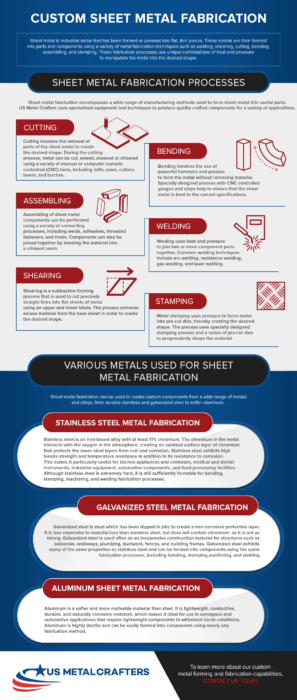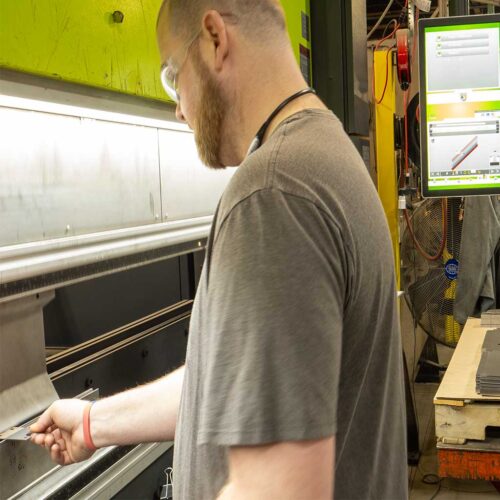Sheet metal is industrial metal that has been formed or pressed into flat, thin pieces. These sheets are then formed into parts and components using a variety of metal fabrication techniques such as welding, shearing, cutting, bending, assembling, and stamping. These fabrication processes use unique combinations of heat and pressure to manipulate the metal into the desired shape.

Sheet Metal Fabrication Processes
Sheet metal fabrication encompasses a wide range of manufacturing methods used to form sheet metal into useful parts. US Metal Crafters uses specialized equipment and techniques to produce quality crafted components for a variety of applications.
Cutting
Cutting involves the removal of parts of the sheet metal to create the desired shape. During the cutting process, metal can be cut, sawed, sheared or chiseled using a variety of manual or computer numeric controlled (CNC) tools, including mills, saws, cutters, lasers, and torches.
Bending
 Bending involves the use of powerful hammers and presses to form the metal without removing material. Specially designed presses with CNC controlled gauges and stops help to ensure that the sheet metal is bent to the correct specifications.
Bending involves the use of powerful hammers and presses to form the metal without removing material. Specially designed presses with CNC controlled gauges and stops help to ensure that the sheet metal is bent to the correct specifications.
Assembling
Assembling of sheet metal components can be performed using a variety of connecting processes, including welds, adhesives, threaded fasteners, and rivets. Components can also be joined together by bending the material into a crimped seam.
Welding
Welding uses heat and pressure to join two or more component parts together. Common welding techniques include arc welding, resistance welding, gas welding, and laser welding.
Shearing
Shearing is a subtractive forming process that is used to cut precisely straight lines into flat sheets of metal using an upper and lower blade. The process removes excess material from the base sheet in order to create the desired shape.
Stamping
Metal stamping uses pressure to force metal into pre-cut dies, thereby creating the desired shape. The process uses specially designed stamping presses and a series of pre-cut dies to progressively shape the material.
Various Metals Used for Sheet Metal Fabrication
Sheet metal fabrication can be used to create custom components from a wide range of metals and alloys, from durable stainless and galvanized steel to softer aluminum.
Stainless Steel Metal Fabrication
Stainless steel is an iron-based alloy with at least 11% chromium. The chromium in the metal interacts with the oxygen in the atmosphere, creating an oxidized surface layer of chromium that protects the lower steel layers from rust and corrosion. Stainless steel exhibits high tensile strength and temperature resistance in addition to its resistance to corrosion. This makes it particularly useful for kitchen appliances and cookware, medical and dental instruments, industrial equipment, automotive components, and food processing facilities. Although stainless steel is extremely hard, it is still sufficiently formable for bending, stamping, machining, and welding fabrication processes.
Galvanized Steel Metal Fabrication
Galvanized steel, renowned for its cost-effectiveness, undergoes a zinc dipping process to acquire a durable, non-corrosive protective coating. This makes it a more affordable alternative to stainless steel. While it lacks chromium, which contributes to the superior strength of stainless steel, galvanized steel still maintains a robust profile suitable for various construction applications. Its widespread use in the construction industry includes key roles in building robust balconies, secure walkways, reliable plumbing systems, efficient ductwork, sturdy fences, and resilient building frames. Notably, galvanized steel shares many characteristics with stainless steel, allowing it to be shaped and formed through similar fabrication techniques such as bending, stamping, machining, and welding. This versatility further enhances its appeal in diverse construction and manufacturing sectors.
Aluminum Sheet Metal Fabrication
Aluminum is a softer and more malleable material than steel. It is lightweight, conductive, durable, and naturally corrosion resistant, which makes it ideal for use in aerospace and automotive applications that require lightweight components to withstand harsh conditions. Aluminum is highly ductile; It can be easily formed into components using nearly any fabrication method.
Custom Sheet Metal Fabrication by US Metal Crafters
US Metal Crafters has been a leading provider of sheet metal fabrication services in North Carolina and around the world. We offer low-cost sheet metal fabrication for customers in telecommunications, transportation, industrial, and agriculture industries, among many others. Our experienced and knowledgeable specialists will work with you to design and manufacture custom sheet metal components, to meet even the most stringent specifications. To learn more about our custom metal forming and fabrication capabilities, contact us today.





